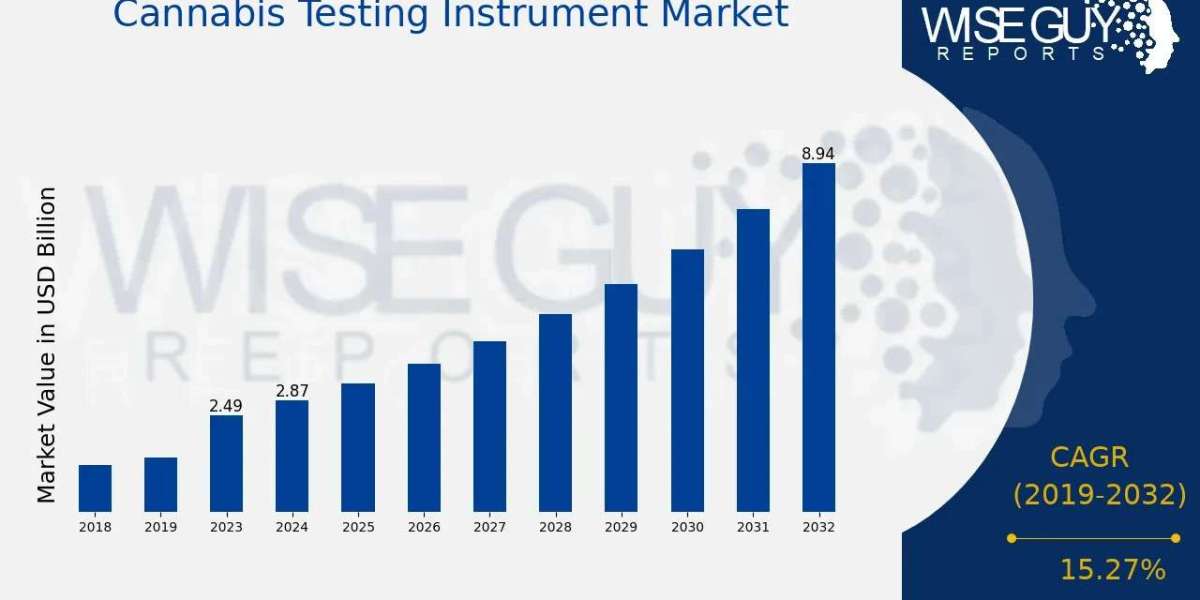Why the Cannabis Testing Instrument Market is Set to Grow in 2025
The cannabis industry has experienced remarkable growth over the last decade, with the legalization of both medical and recreational cannabis in various regions across the globe. As the market continues to expand, so does the need for accurate and reliable testing instruments. Cannabis testing instruments play a crucial role in ensuring product quality, safety, and compliance with regulatory standards. With growing consumer demand for consistent and safe cannabis products, the cannabis testing instrument market is poised for significant growth in 2025 and beyond.
The Increasing Demand for Cannabis Testing
As cannabis becomes more widely accepted and legalized in different parts of the world, the need for testing instruments to ensure safety and consistency is more important than ever. Consumers now expect cannabis products to meet high standards of purity and potency. Whether it’s for recreational use or medicinal purposes, individuals are seeking products that are safe, effective, and accurately labeled. Testing instruments are essential for ensuring that cannabis products meet these expectations by measuring levels of THC (tetrahydrocannabinol), CBD (cannabidiol), pesticides, residual solvents, and other impurities that may be harmful to health.
Moreover, regulatory bodies in various countries are imposing stricter guidelines and regulations on cannabis products. For example, the U.S. Food and Drug Administration (FDA) and state regulatory agencies are demanding that cannabis products undergo rigorous testing to comply with health and safety standards. These regulations are fueling the demand for accurate and precise testing equipment. As the cannabis industry continues to grow, these regulatory measures are expected to increase, driving the need for advanced testing technologies.
Technological Advancements in Cannabis Testing Instruments
The rapid development of testing technologies is another factor contributing to the growth of the cannabis testing instrument market. In recent years, there have been significant advancements in the types of instruments available for cannabis testing. High-performance liquid chromatography (HPLC), gas chromatography (GC), mass spectrometry (MS), and near-infrared spectroscopy (NIR) are among the technologies used to test cannabis products. These methods enable accurate testing of cannabinoids, terpenes, and other compounds found in cannabis plants.
Newer technologies are also being integrated with artificial intelligence (AI) and automation, allowing for faster and more accurate testing processes. AI-driven software can analyze data more efficiently and help identify patterns that may have been missed by traditional testing methods. This helps in making real-time decisions about the quality and potency of cannabis products, improving both product consistency and the speed of analysis.
Furthermore, as cannabis cultivation techniques improve, the complexity of testing increases. More advanced and precise testing instruments are required to evaluate a broader range of substances in cannabis. As a result, the market for testing instruments is evolving to meet these new demands, and companies are investing heavily in innovation to stay ahead of the competition.
Rising Consumer Awareness and Focus on Quality Control
In addition to regulatory compliance, there is a growing consumer demand for transparency and quality assurance in the cannabis industry. Consumers today are more knowledgeable and conscientious about the products they consume. This heightened awareness is driving demand for cannabis products that are certified safe and meet specific potency requirements. Testing instruments help producers and retailers ensure that their products are accurately labeled and free from harmful substances, such as residual pesticides or solvents.
In turn, this demand for quality control has pushed many cannabis producers to invest in sophisticated testing equipment. By offering products that are consistently tested for purity, potency, and safety, cannabis companies can build trust with their customers, differentiate themselves in a crowded market, and ultimately boost their sales. As the industry matures, this focus on quality control is expected to expand further, fostering increased adoption of cannabis testing instruments.
Expanding Legalization and Market Growth
The global cannabis market is growing, and legalization continues to expand across various regions, including Europe, Asia, and Latin America. As more countries legalize cannabis for medicinal or recreational purposes, the demand for cannabis testing instruments will increase. For instance, Canada’s full legalization of cannabis in 2018 has led to the establishment of stringent testing requirements. Similarly, in the U.S., many states have legalized cannabis for recreational use, and this trend is expected to spread to more states in the coming years.
In regions where cannabis is not yet fully legalized, the medical cannabis market is gaining traction. This has led to the introduction of regulatory frameworks in these areas, which require the testing of cannabis products for both safety and efficacy. The introduction of such regulations will only strengthen the demand for testing instruments, which will be required to ensure compliance with legal standards.
The Role of Cannabis Testing Instruments in the Medical Sector
While recreational cannabis is garnering attention, the medicinal cannabis market is one of the primary drivers of growth for testing instruments. Medical cannabis, used to treat conditions like chronic pain, epilepsy, and anxiety, needs to be precisely tested to ensure patients receive the correct dosage and potency. Testing instruments that measure cannabinoid levels and other factors can help create personalized treatment plans for patients, thus enhancing the efficacy of medical cannabis use.
The increasing focus on patient safety and tailored treatments will drive continued growth in the demand for cannabis testing instruments. As medical cannabis becomes more widely prescribed, more doctors and healthcare professionals will seek out tools to monitor and validate the potency and safety of the products they recommend.
Conclusion: A Bright Future for Cannabis Testing Instruments
As the cannabis industry continues to grow and mature, the market for cannabis testing instruments is poised for significant expansion in 2025 and beyond. With stricter regulations, greater consumer awareness, and ongoing technological advancements, the demand for reliable and accurate testing equipment will only increase. Cannabis producers and healthcare providers alike will continue to rely on these instruments to ensure the quality and safety of cannabis products.
The convergence of innovation, regulation, and market demand will create substantial growth opportunities for companies in the cannabis testing instrument space. As a result, this market is expected to play a pivotal role in ensuring the continued success and sustainability of the global cannabis industry.














